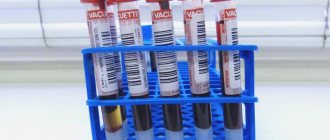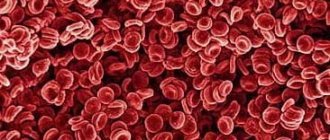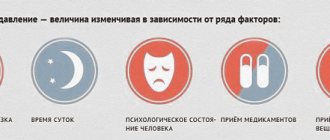Increased blood viscosity is one of the most common causes of the development of chronic diseases of the cardiovascular system.
What is that “thick blood”? This is a state when the concentration of the formed elements from which it consists is increased.
These are predominantly prothrombin and fibrinogen, but often high viscosity is associated with an increased concentration of red blood cells, platelets, leukocytes, hemoglobin, glucose, cholesterol, lipid compounds, and so on.
And the primary reason for all this is poor nutrition and food, from which a person receives all micronutrients. What products are the most “harmful” in this regard? Which ones thicken the blood? Let's turn to official research for information.
Comes only from outside
“Ascorbic acid, also known as vitamin C, is a vitamin that is not formed in the human body on its own, but only enters it from the outside, with food. In this regard, it becomes clear that deficiency can occur with unbalanced and inadequate nutrition,” notes Evgenia Parshina, allergist-immunologist of the highest qualification category, head of the department of allergology and immunology of the Central Clinical Hospital of the Russian Academy of Sciences, assistant of the department of immunology of the Russian National Research Medical University named after. N.I. Pirogova.
What is vitamin C for?
Of course, many are concerned about the question of what ascorbic acid is needed for. It is traditionally believed that vitamin C is an immunity booster. However, the spectrum of its effect on the body, as doctors note, is much wider. So, the body needs ascorbic acid to:
- Provide metabolism.
- Synthesize neurotransmitters - norepinephrine and serotonin - which play an important role in the overall functioning of the body.
- The vitamin has antiplatelet (prevents platelets from sticking to each other and sticking to the walls of blood vessels, which prevents blood clots) and antioxidant properties.
- It regulates immunological reactions, that is, the vitamin is responsible for increasing resistance to infections.
It is also responsible for the proper functioning of other biochemical and protective mechanisms, notes Evgenia Parshina.
Superfood at the window. Why is it especially beneficial to grow microgreens in spring? More details
Bananas in cooking
Most often, bananas are consumed fresh. Fragrant circles are also added to cottage cheese, yoghurts, and various desserts. If banana pulp is added to the dough, the baked goods will be more juicy. In addition, soft fruits are used to make creams. There is even banana flour.
In addition, bananas are dried and baked, syrups and cocktails are prepared on their basis, and they are an integral part of fruit salads.
Found a violation? Report content
How to replenish supplies?
Many people are interested in how stable vitamin C is and how it can be replenished in the body. “Vitamin C is extremely unstable in the external environment and is quickly destroyed when heated. For example, when vegetables or fruits are boiled for two to three minutes, vitamin C is completely destroyed. It doesn’t react except to quick freezing,” says Evgenia Parshina. This means that in frozen berries, for example, it will be preserved almost in full.
Vitamin C enters the body with plant foods. But, given modern realities, as the immunologist says, it becomes clear that vitamin C deficiency is one of the most common deficiencies. This is usually associated with two points:
- Compliance with a variety of diets, since this diet is associated with exceptions or the inability to eat fresh vegetables and fruits.
- Highly processed, where foods containing the vitamin are processed inappropriately.
Doctors recommend a specific list of products that must be used if there is a goal to replenish the level of vitamin C in the body. It includes:
- rose hip;
- Bell pepper;
- currant;
- sea buckthorn;
- cabbage, and in different versions: Brussels sprouts, white cabbage, cauliflower;
- potato;
- tomatoes;
- parsley;
- dill;
- apples;
- pineapples;
- citrus.
It is worth understanding the dosages of such products that contain the daily requirement. “The daily requirement for vitamin C is on average 90 mg. So, for example, the daily dose is contained in 225 grams of lemon or 45 grams of black currants, 200 grams of sauerkraut,” says Evgenia Parshina.
Question answer
How is compote healthier than juice?
Top 9 Foods That Increase Blood Viscosity
In most cases, a person’s daily diet has a key influence on blood viscosity. What products increase its density and what is the reason for this? Below you will see a list of the most effective blood thickening foods.
Sugar
This is one of the most “harmful” products with high blood viscosity. Excess carbohydrates in the body accumulate in the form of glycogen in the liver. And if it is not “demanded” by the body (for the release of energy), then it is synthesized into fatty compounds. Simply put, lipids, which enter the bloodstream, provoke the formation of blood clots .
Sugar is also extremely harmful to the heart and blood vessels.
Modern people consume about 15 times more sugar than at the end of the 19th century. At the same time, the physical activity of the majority has decreased significantly (almost every third person has sedentary work). That is why sugar today is often called “white death” by doctors themselves - it is the main cause of chronic diseases of the cardiovascular system, hypertension, liver and gastrointestinal diseases.
Potato
This vegetable contains a large amount of tannins, which contribute to blood thickening. It also contains starch, which is synthesized into simple and complex carbohydrates. And they, as mentioned above, when in excess are transformed into lipid compounds , which increase blood viscosity.
Fried potatoes are especially harmful, as they are also quite a fatty dish. Less harmful - boiled or baked (but it is recommended to soak the peeled potatoes for several hours in cool water - this helps to “wash out” a considerable amount of starch).
Bananas
They are one of the largest natural sources of sugars in fruits (mainly fructose), which increases blood viscosity.
Read more about the effect of bananas on blood vessels here.
If you believe the words of nutritionists, then you can eat up to 2 small bananas every day, and even 2 times less for children. And this is true provided that a person completely refuses sweet desserts.
Animal fats
Dairy products are known to thicken the blood. Also, the content of animal fats is high in various types of sausages. You can also add butter, different types of cheeses, sour cream, and so on.
Animal fat is not absorbed as well and quickly as vegetable fat, but at the same time it provokes a sharp increase in blood lipid levels.
Carbonated drinks
Many of them contain sugar content of about 25 – 40%. For example, in the popular Coca-Cola - that’s exactly how much.
And even zero-calorie carbonated drinks lead to an increase in blood viscosity , since they use sweeteners, and often phenolphthalein (or its derivatives). Various energy drinks are especially harmful.
It is also worth mentioning that any carbonated drinks accelerate the absorption of glucose into the blood through the walls of the gastrointestinal tract, which leads to a sharp increase in sugar levels.
Alcohol
In any form, alcohol affects the thickness of the blood, since potassium is actively used to break it down and remove it from the body (which is excreted through the kidneys, which is why a person has a frequent urge to urinate).
Beer and other drinks made with hop malt are especially dangerous for the blood, since for their preparation a large amount of sugar is added to the wort (it is thanks to this that the drink goes through fermentation).
Buckwheat
Although consuming buckwheat helps avoid atherosclerosis, it also increases blood viscosity due to the high content of lecithin and its derivative elements .
But it is recommended to use it for diabetes mellitus, in the initial stages of anemia - this will really help normalize blood clotting.
In this article you will find 5 blood thinning cereals.
Wheat flour bread
Due to its high glucose content, it is strictly not recommended for diabetics. At the same time, all baked goods based on wheat flour have a high glycemic index, that is, their consumption provokes a sharp jump in blood sugar levels.
It is better to refuse such bread altogether, replacing it with rye, or even better, with grain bread (with wholemeal flour). This will help not only balance blood viscosity, but also provide the body with fiber - it is necessary for the normal functioning of the gastrointestinal tract.
Walnuts
They contain a high content of tannins, which make the blood denser and thicker .
But you shouldn’t completely give up nuts, since they also contain omega-3 unsaturated acids - they are necessary for the brain to stimulate intercellular metabolic processes.
Who is at risk?
Since vitamin C deficiency is quite common, everyone needs to monitor its level and replenish it on time. But there are categories of people for whom it is especially necessary to check this parameter and make up for the deficiency. So, in the group of those especially in need of vitamin C are:
- pregnant and lactating women;
- people living in cold climates;
- people working in industries with hazardous working conditions;
- people who have such a bad habit as smoking.
“A complete lack of vitamin C in the body leads to the development of a disease such as scurvy. Its symptoms are loss of strength, bleeding, hair and teeth loss, and joint pain. This condition was recorded among sailors in past centuries,” says Evgenia Parshina. The immunologist also emphasizes that today a critically low level of vitamin C leads to symptoms such as bleeding gums when brushing teeth. But, of course, first you should exclude other reasons that could lead to such a problem.
Selfish interest. How to treat vegetable and fruit peels Read more
general information
In most cases, the blood needs to be thinned. This is required, for example, for atherosclerosis, a tendency to thrombosis, and varicose veins.
It is too thick blood that causes the formation of blood clots, which, in turn, provoke heart attacks, strokes, heart failure syndrome and other common diseases of the cardiovascular system.
But in some cases, a person’s blood may be too “thin” and, on the contrary, needs to be thickened. For example, in diabetes mellitus, blood clotting is reduced due to a low platelet concentration. A slight thickening of the blood plasma in this case allows you to speed up the healing of wounds and slow down the process of leaching potassium from the body. By the way, the same thing happens with anemia.
How to find out the current viscosity of your blood? The simplest option is to undergo a general analysis followed by establishing the hematocrit number (which is the numerical ratio of formed elements to plasma). A similar test can be taken at any public or private clinic.
The normal hematocrit number varies depending on age and gender. The average is from 35 to 45%. But in newborns it can even reach 62–65%.
A significant deviation from the norm indicates an imbalance of the formed elements and requires a more detailed study of the patient’s physiological state.
Can there be an overdose?
Against the backdrop of the question of vitamin C deficiency, many may have a question about the opposite situation: is there a risk of hypervitaminosis? “Hypervitaminosis is not usually described because excess vitamin C is excreted in the urine. However, now it is not uncommon for people to abuse vitamin C, consuming it in the form of dietary supplements or pharmaceutical preparations. This only leads to the development of toxic-allergic reactions and impaired kidney function. It is worth noting that such problems do not arise with natural consumption of vitamin C with food,” says Evgenia Parshina. This means that ascorbic acid is extremely important for the human body, but it should only be supplied to it through natural products.
The role of bananas in the nutrition of athletes
During intense training, athletes expend a large amount of energy, which must be restored immediately. In this case, a banana can be considered a lifesaver. This snack is much more convenient than, for example, chicken and rice. One or two bananas will be enough to close the carbohydrate window.
How do the oldest film and theater actors in Russia live, celebrating their 95th anniversary?
10 dollars an hour. What kind of work did Marilyn Monroe find before becoming famous?
I tested my feelings for 40 years, I was in love with Fateeva: revelations of Pankratov-Cherny
In addition, potassium, which protects the heart muscle, is washed out of the body along with sweat. This can lead to seizures. Thanks to the amino acids contained in bananas, athletes focus better, calm their nerves and improve concentration.
We can conclude that bananas contain the ideal concentration of substances that are necessary for both amateur and professional athletes. True, some athletes prefer energy bars to bananas. But you can often see tennis players snacking on the fragrant fruits near the court, and hockey players eating them while sitting on the bench.
![Table 2. Hemodynamic definition of PH (adapted from [2] with modifications)](https://ms-pi.ru/wp-content/uploads/tablica-2-gemodinamicheskoe-opredelenie-lg-adaptirovano-iz-2-s-izmeneniyami-330x140.jpg)










